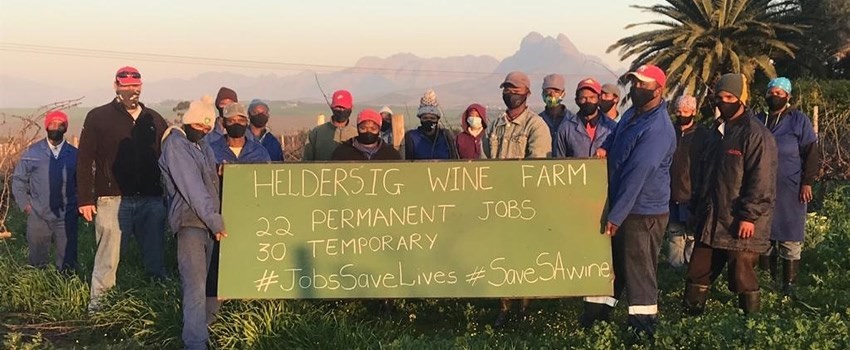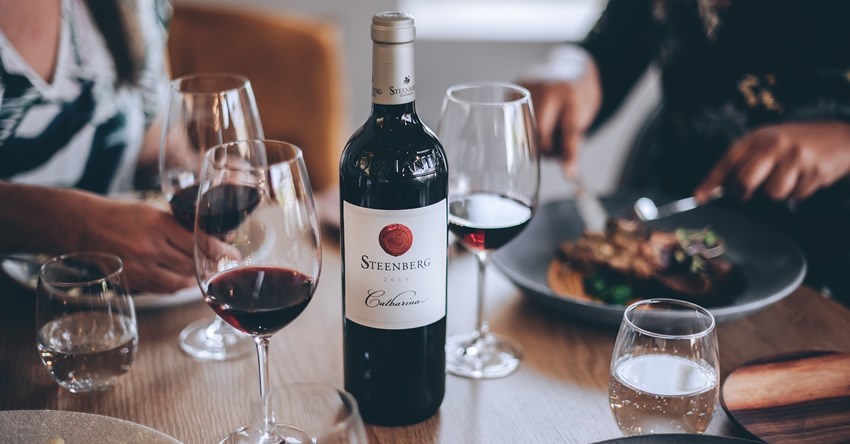The best-laid plans of mice and men often go awry wrote Robbie Burns, no stranger to liquor, in his famous poem penned “To a mouse” after he destroyed its nest. And so 2020 went awry – the year of the unpredictable and inconceivable when the most deadly virus since the Spanish flu laid waste the global economy and led to a devastating temporary prohibition of the sale of alcohol in South Africa. The best-laid predictions of domestic and export growth in 2020 made in late 2019 went awry too.
Although it is too early to calculate the impact of the temporary lockdown ban on off-trade and on-trade domestic (and export) sale of alcohol, 2020 will go down in the record books as a bitter vintage for wine farmers and wine producers in terms of job losses and financial losses. Direct losses to the South African wine industry between March to July 2020 alone are estimated at R2,5 billion. The domino effects of massive losses in the value chain include inter alia grape growers and wine producers, the bottling, glass recycling, cork, labelling, packaging and transport industry, the wine retail sector, bars, restaurateurs, sommeliers and hoteliers, the wine tourism industry, and more.
The tough survival message was Adapt or die – and the South African liquor industry rose to the occasion. The lifting of the first alcohol ban mid-year saw a massive surge in wine sales away from the on-trade table and off-trade shelf to online retail and direct wine cellar-to-consumer delivery. Following the global trend to online grocery sales during lockdown to reduce the spread of Covid-19, many online wine retailers struggled to cope with the sudden wave of online orders, and had to increase warehouse, administrative and distribution capacity. But did panic buying, stockpiling and the backlog of online orders make up for lost wine sales during the first and second alcohol bans? And are wine shops and supermarkets selling more wine now that restricted trading hours are over?
Pau Roca, director of the International Organisation of Vine and Wine (OIV) offers some fascinating insights into the knock-on effects of bar, night club and restaurant closures under national lockdown. Predicting a major shift from traditional wine distribution channels, he comments that ongoing temporary closures in the hospitality sector could lead to a reduction of 35% in volume and 50% by value of wine sales in Europe in 2020. While the logistical strain of the surge in online demand is still a problem, he predicts continued growth in digital channels. He concludes that the advantages of the Internet (unlike supermarkets which stock a cheaper, limited range of wine) is that it does not restrict consumer choice in terms of price and range of products.(Vitisphere, April 2020)
But every cloud has a silver lining. Responding bravely to the challenge of trading conditions in 2020, wine producers, chefs, sommeliers, wine lovers and the wine lobby launched high-profile social media campaigns from #SaveSAWine, #DrinkSouthAfrican and #60in60 to the #RestaurantRescueProject, #OneMillionSeats and #jobssavelives campaigns to rally consumers and highlight the devastating effects of lockdown. While Covid-19 accelerated the decline of the print industry as a medium for marketing wine to South African consumers – with the loss of many wine columns as over thirty magazines went under – the wine industry opened up innovative new digital communication channels as wine producers launched new releases and showcased annual wine competitions and events at virtual online tastings and digital zoom events. The Sauvignon Blanc Association even delivered a fine dining menu to media at home to go with its top ten online event.

It has been a tough year for food and wine writers who live on the fringe of the core wine industry. My first online wine tasting was a learning curve for a print dinosaur like me. Even though I inadvertently joined the session under the misnomer of Mrs Heather Howe (my wife controls the Zoom settings), at least I managed to participate with my real-time mug-shot beaming back with delight on-screen. My previous effort saw me joining a Zoom session with a black space where my face should have been, so I guess that’s progress. Either way, Zoom tastings broke all those months of isolation – and it was good to spot old friends online though I prefer to drink in company.
I lost my online virginity over a Zoom tasting with Avondale in October 2020. In a study in contrast, viticulturist Jonathan Grieve led a futuristic zoom tasting of his intriguing new release of Qvevri Red 2019, a wine made using the world’s oldest winemaking techniques in clay vessels used in Georgia 8000 years ago. While quivering for the Zoom tasting to start, playing with a miniature desk qvevri gifted with the sample wine, I wondered what that first Qvevri 6000 BC vintage tasted like? Made from organic Grenache, Syrah and Mourvedre, fermented naturally using wild yeast, whole-bunch grapes and manual punchdowns in these tapered, handmade clay vessels from Georgia, Qvevri Red 2019 is the perfect expression of the earthy, biodynamic, organic philosophy and style of Avondale.
The first post-lockdown wine tasting in situ was a significant milestone in 2020. After months of lockdown isolation, the bubble broke – at an event which observed the new social distancing rules. Celebrating twenty years of fine wines, Tokara presented a tutored tasting of its Reserve Collection of Elgin Sauvignon Blanc 2020 (in SA’s top ten every year), Chardonnay 2019, Cabernet Sauvignon 2017, Syrah 2017 and Director’s Reserve Red 2018 and White 2017. Longstanding viticulturist Aidan Morton, who joined the new cellar in 2000, spoke about the two decades he has spent exploring the terroir of Tokara’s Elgin and Stellenbosch vineyards – while winemaker Stuart Botha spoke about the Tokara house style over a tasting of the first three vintages he has made here since joining in 2017.
In a normal wine year, I would attend some sixty tastings a year out and about in the Cape winelands. In the long shadow of Corona, I have participated in more virtual online tastings this year than the real-time tastings I can count on the fingers of one hand. I attended a vertical tasting of Steenberg’s flagship Catharina blend in late November led by new winemaker Elunda Basson who joined this iconic Constantia cellar in mid-2019. Ably stepping into the boots of Steenberg’s trio of legendary winemakers to date – respectively, Nicky Versveld, John Loubser and JD Pretorius – she presented a line-up of key vintages from 1997 – 2017 of what she calls “an authentic terroir-based blend”. Created to showcase the cooler-climate style of Bordeaux-style blends from Constantia, the assemblage of this elegant Merlot-led blend has evolved over the years to show the best barrels and blocs by vintage – and experimented with Shiraz, Cabernet Franc and Petit Verdot components.

Last but not least, one event I never miss is the annual Blaauwklippen Blending competition (cheekily named BBC), the longest running blending competition in the world now in its 37th year. This showcase for the South African wine industry, an outreach event which promotes a passion for wine among wine clubs nationwide, symbolises triumph in the face of a year of adversity. Winemaker Narina Cloete says the second alcohol ban in July took place two days before the blending wines were to be distributed, delaying the competition –and the number of participating clubs decreased from 76 in 2019 to 49 in 2020. But the trophy blend (Shiraz with Merlot, Cabernet Franc and Petit Verdot), won by the Thursday Club, has entered the BBC 25 times – and won twice. Two wine clubs have entered every year for 35 years. Now there’s loyalty and perseverance for you.